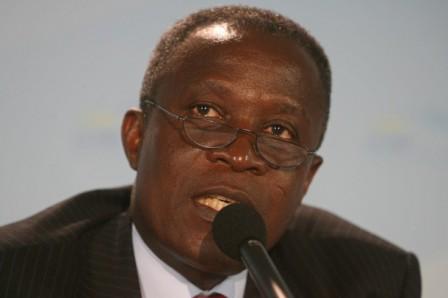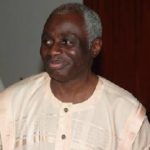“Life is incomplete without death.” I heard a pastor say this about ten years ago. It stuck in my mind and it’s what I often say – to myself and to console friends – when I hear of the death of someone they loved. On Wednesday, it dawned on me that those words just don’t make any sense. How can death make a life that has been so suddenly cut short complete? When I heard of the death of finance minister, Kwadjo Baah-Wiredu the only three words made sense to me: “it isn’t true.” I was in denial.
I had to force myself to face reality only after I heard Anthony Akoto Osei cry. I hardly knew Baah-Wiredu. Usually, I won’t waste a second thinking about why someone died. I don’t cry for dead people because I believe, death should be a welcome respite from the many travails of life.
But Baah-Wiredu’s sudden passage is forcing me to start thinking like most other (right thinking) human beings do: death is cruel. Last time I saw him was at the OECD conference on aid effectiveness in Accra. He looked so bubbly and was, as usual, all smiles. If I had known he was going to die just about 20 days after that event, I would have walked up to him and told him what I thought of him.
I hardly knew Mr. Baah-Wiredu. But I’ve had quite a number of interactions with him since he became a minister of state. I’ve dealt with a lot of other ministers too and I think he’s just one of a kind. Ministers of state can be quite vain and pushy. A lot of them are snobbish and vexatious. Ministers of state (and politicians in general) often take great delight in lying through their teeth. They often like to throw their weights about and show the rest of us that they are the “big men”. Ministers of state in this country only feel important when they make the rest of us feel like we are ‘nobodies’.
- Advertisement -
But Baah-Wiredu was completely different. From my few interactions with him, he struck me as an honest, sincere politician. I never had any cause to think that he was lying. And trust me, I can tell when a politician has closed the chapter on the truth.
Baah-Wiredu was also very humane. He was an unpretentious man who knew that he didn’t have to make anyone feel inferior for him to feel superior. He called everyone “massa” – master – just to put people at ease.
Baah Wiredu hardly turned down an interview request from me – and definitely not with an excuse that he was busy. Most journalists will tell you that he only declined an interview request when he didn’t have the facts. Even so, he would tell you when to call him back. You will do so at the appointed time and he would have all the facts you need. He had the knack for making even the most complicated economic issues seem so simple for people with fickle minds like mine. For him there was nothing like a stupid question.
Unlike many of his colleagues, who liked to berate ‘ignorant’ journalists, Baah-Wiredu always saw an opportunity to teach whenever he came into contact with people who didn’t know as much as he did. That makes people like me feel good and at ease. Since most journalists don’t like to be called to as “ignorant”, they pretend to know what they know they don’t know. But when you have people like Baah-Wiredu around, ‘ignorance’ may be a disease, but one which can very easily be cured – for it is only when you wear your badge of ignorance that you acquire knowledge.
This country needs people like Baah-Wiredu. He was to the NPP was John Mahama is to the NDC. He was hardworking, modest (he used a Nokia 1100), fair-minded, consensus builders. People like Baah-Wiredu don’t take themselves too serious and yet they know where there is serious work to be done. These people shouldn’t die young. I think the ‘angel of death’ made a mistake. He picked the wrong guy at the wrong time and it makes no sense.
That pastor who said “Life is incomplete without death” didn’t know Kwadjo Baah-Wiredu.
“Now I’ve learned, the hard way, that some poems don’t rhyme, and some stories don’t have a clear beginning, middle, and end. Life is about not knowing, having to change, taking the moment and making the best of it, without knowing what’s going to happen next. Delicious Ambiguity.” – Gilda Radner


